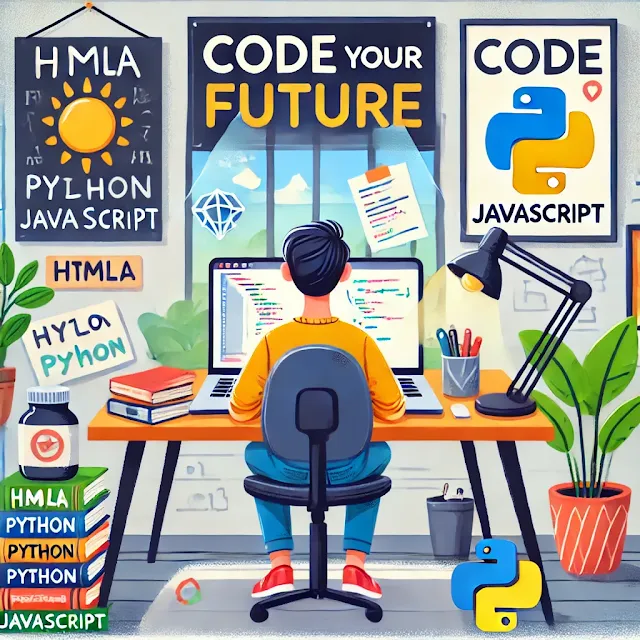Have you ever dreamed of writing code that powers websites, apps, or even the next big tech innovation?
Learning programming basics can feel daunting, but the journey is worth it.
What if you had a clear path to guide you? Whether you're starting from scratch or revisiting your coding aspirations, this guide will equip you with practical tips and relatable stories to help you succeed.
Starting your programming journey is like learning a new language. It’s challenging but rewarding. Let’s dive into how you can master the basics, step by step
Start with the Right Language
Choosing your first programming language is crucial. Think of it as picking the best tool for the job. For beginners, Python and JavaScript are excellent options. Python’s simple syntax makes it beginner-friendly, while JavaScript is ideal for creating interactive websites.
When I started my programming journey, I chose Python because of its versatility. It helped me focus on concepts rather than syntax. Consider your goals: Do you want to develop websites? Start with HTML, CSS, and JavaScript. Interested in data science? Python is your friend.
Build Programming Fundamentals
Before jumping into advanced projects, get your fundamentals clear. Understand how programming works at its core. Learn key concepts like variables, loops, functions, and data structures. These form the backbone of every program you’ll write.
Spend time understanding computer architecture basics, such as how a CPU processes information and how memory works. This knowledge will deepen your understanding of how programs are executed.
Practising coding by hand can also strengthen your fundamentals. Writing code on paper forces you to think critically and improves problem-solving skills.
Leverage Learning Resources
The internet is a goldmine for coding tutorials and courses. Platforms like Codecademy, freeCodeCamp, and Coursera offer beginner-friendly lessons. Explore YouTube tutorials for visual learning and practice coding challenges on HackerRank or LeetCode.
When I started, I used freeCodeCamp to learn HTML and CSS basics. The interactive exercises kept me engaged, and the sense of accomplishment motivated me to keep going. Combine multiple resources to find the ones that work best for you.
Build Practice Projects
One of the best ways to solidify your skills is by building practice projects. Start small. Create a personal website using HTML and CSS or a simple calculator with Python. Projects help you apply what you've learned and make abstract concepts real.
When you complete a project, you’ll encounter challenges. Debugging errors, researching solutions, and solving problems build your confidence. Over time, these small victories will keep you motivated.
Find a Mentor or Coding Community
Having a mentor or being part of a coding community can accelerate your learning. A mentor provides guidance, answers questions, and helps you avoid common pitfalls. Coding communities, whether online forums like Stack Overflow or local meetups offer a space to share knowledge and collaborate.
I joined a local developer group early in my journey. Interacting with experienced programmers gave me insights that no book or course could offer. Don’t hesitate to ask for help—everyone starts as a beginner.
Practice Regularly
Consistency is key to mastering programming. Dedicate a specific time each day to practice coding, even if it’s just 30 minutes. Avoid skipping days; programming skills improve through repetition.
When I struggled with loops initially, I set a goal to write five different loop programs daily for a week. By the end, loops felt intuitive. Break complex concepts into smaller tasks and practice consistently.
Use Debuggers and Command Line
Learning to debug your code is an essential skill. A debugger helps you step through your code, understand its flow, and identify errors. Most Integrated Development Environments (IDEs) have built-in debuggers that are easy to use.
Practising command line basics is equally important. Understanding commands like ls, cd, and mkdir enhances your efficiency. These tools may seem intimidating initially but become second nature with practice.
Learn by Observing Others
Take time to study how other programmers write code. Platforms like GitHub host repositories where you can view real-world projects. Analyze their structure, style, and logic. This practice can introduce you to new techniques and best practices.
When I discovered open-source projects on GitHub, it was a game-changer. Reading others’ code improved my coding standards and broadened my perspective on solving problems.
Take Breaks and Stay Motivated
Programming can be overwhelming, especially when you're stuck. Take short breaks to clear your mind and come back with fresh energy. Celebrate small milestones to keep yourself motivated.
Remember, progress takes time. Enjoy the process and focus on the skills you’re building. Every line of code you write is a step closer to your goal.
Conclusion
Embarking on a programming journey is both exciting and challenging. By starting with the right language, mastering the basics, and practising regularly, you’re laying the foundation for a rewarding career. Surround yourself with mentors and communities, leverage free resources, and stay consistent.
Your first lines of code might be simple, but they’re the beginning of something extraordinary. Keep learning, keep practising, and let your passion for programming guide you toward success.
